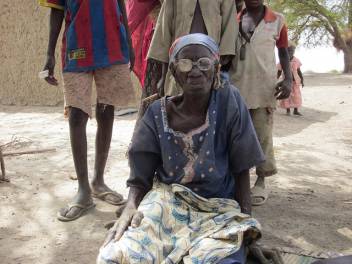 The Sahel region of Africa which covers countries from Mauritania in the West to Sudan and Eritrea in the East, via Chad is facing a new severe food and nutrition crisis.
The Sahel region of Africa which covers countries from Mauritania in the West to Sudan and Eritrea in the East, via Chad is facing a new severe food and nutrition crisis.
In Chad, the number of vulnerable people increased from 500,000 in 2009 to almost four million in 2011 due to floods, disease outbreaks, drought, instability and limited resources. To date, 3.6 million people in Chad do not have enough food to meet their basic needs. The health system is very weak and the government has few emergency stocks.
It’s in this context that I spoke to Pascale, HelpAge’s Emergency Health and Nutrition Adviser and Amandine, our Emergency Protection Programme Coordinator. They have been in Chad assessing the drought situation and whether we can intervene to help older people affected by the loss of crops and rising food prices.
Poor harvest in Chad
They travelled to the West of Chad, near the town of Massaguet, in Hadjer-Lamis region. The area is close to Lake Chad and even though it still has fish, stocks are down and the level of the lake is retreating. Luckily, the West of Chad is less affected by population displacements in comparison to the East which is home to thousands of refugees from Sudan.
The main problem however is that last year’s harvest was extremely poor. In 2010 when the harvest was good, most people had around 15 bags of maize, rice or other seeds and grains that they produced to last them until their next crops. In 2011, most only had four bags or less. Worryingly, the rainy season is not due for a month or two and some families are struggling to find food to last until then.
Around 5% of the population of Chad is 60 and over, with 27,600 of these in the Hadjer-Lamis region. There is no information on the health of older people and, despite their vulnerability, the food and nutrition responses from NGOs focus on children and pregnant and lactating women. Pascale quoted someone saying: “Older people are number two priority, but we never get around to number two.”
Whilst in Chad, they met with Merlin to discuss the possibility of working together to support older people as we have done in other situations, for example Pakistan. Merlin is currently running nutrition programmes to help children, as well as pregnant and lactating mothers in one district of the Hadjer-Lamis region.
Older people invisible
Other observations that came from our conversation were that, at a national level, older people are completely invisible. The health system is not adapted to older people’s needs, is still trying to contain communicable diseases, such as cholera, polio, malaria and measles, and focuses heavily on mother and child health. There is a lack of trained health professionals and those who are trained do not know how to deal with older patients.
Many health centres lay empty and there are no affordable drugs available for chronic diseases. The most basic needs such as hygiene need to be provided, and community-based health workers also need to be trained who can provide health education for healthy living.
Amandine interviewed a group of older people to get their impressions on the situation. She spoke to Adoura, 80 from the village of Danouna. She used to be a tiller and owned 30 goats. The drought made the land impossible to farm and her goats died. She had to find another way of earning money so now she is a potter. She can sell a jar for 500 to 750 FCFA (US$1-1.50).
At 80 though, she finds it difficult to work. She has back pains and is more often exposed to malaria. The money she does earn doesn’t stretch very far either. A sack of rice now costs 18,500 FCFA (US$35), up from 12,500 (US$24) two years ago.
Chronic poverty or humanitarian crisis?
It’s clear from Pascale and Amandine’s visit to Chad that the situation is extremely difficult and many are struggling to find food. Chad has suffered from chronic poverty for decades, which is why this most recent crisis raises many questions. Is this a humanitarian crisis or an on-going development issue – or is it both?
Our next step is to do a more in depth nutritional assessment to see how older people are coping in the crisis and what their most pressing needs are. We can also hopefully keep working with other NGOs such as Merlin who have offices and are running programmes in Chad already to reach older people that way. More to follow.
Find out more about the work we do to support older people in emergencies.
